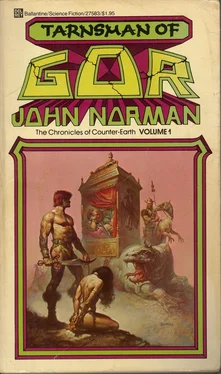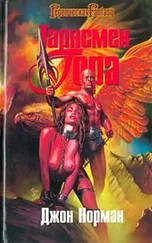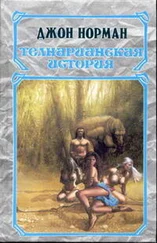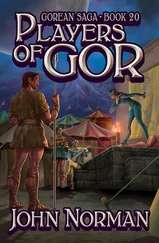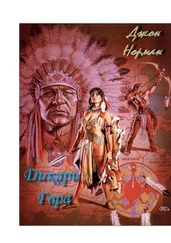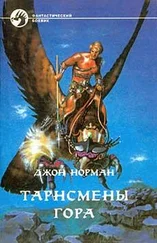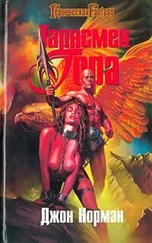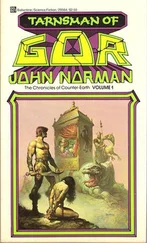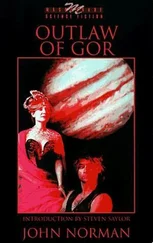"Aren't you going to watch?" she asked brazenly.
"No," I said.
"But I may escape," she laughed.
"That would be my good fortune," I remarked.
She laughed again and disappeared, and I soon heard the sounds of her splashing delightedly in the water. She emerged a few minutes later, having washed her hair and the blue silk gown she wore. Her skin was radiant, the dried mire of the swamp forest at last washed away. She knelt and spread her hair to dry, letting it fall forward over her head and shoulders.
I entered the pool and rejoiced in the invigorating, cleansing water. We slept afterward. To her annoyance, but as a safety measure I thought essential, I secured her a few feet from me, fastening her arms about a sapling by means of the slave bracelets. I had no wish to awake to a dagger being thrust into my breast.
In the afternoon we moved on again, this time daring to use one of the wide paved highways that lead from Ar, highways built like walls in the earth, of solid, fitted stones intended to last a thousand years. Even so, the surface of the highway. had been worn smooth, and the ruts of tharlarion carts were clearly visible, ruts worn deep by centuries of caravans. We met very little on the highway, perhaps because of the anarchy in the city of Ar. If there were refugees, they must have been behind us, and few merchants were approaching Ar. Who would risk his goods in a situation of chaos? When we did pass an occasional traveler, we passed warily. On Gor, as in my native England, one keeps to the left side of the road. This practice, as once in England, is more than simple matter of convention. When one keeps to the left side of the road, one's sword arm faces the passing stranger.
It seemed we had little to fear, and we had passed several of the pasang stones that fine the side of the highway without seeing anything more threatening than a line of peasants carrying brushwood on their backs, and a pair of hurrying Initiates. Once, however, Talena dragged me to the side of the road, and, scarcely able to conceal our horror, we watched while a sufferer from the incurable Dar-kosis disease, bent in his yellow shrouds, hobbled by, periodically clacking that wooden device which warns all within hearing to stand clear from his path "An Affected One," said Talena, gravely, using the expression common for such plagued wretches on Gor. The name of the disease itself, Darkosis, is almost never mentioned. I glimpsed the face beneath the hood and felt sick. Its one bleared eye regarded us blankly for a moment, and then the thing moved on.
It gradually became clear that the road was becoming less traveled. Weeds were growing between cracks in the stone flooring of the highway, and the ruts of the Chalarion carts had all but disappeared. We passed several crossroads, but I kept moving generally in the direction of Ko-ro-ba. What I would do when we reached the Margin of Desolation and the broad Vosk River, I didn't know. The fields of SaTarna were thinning out.
Late in the day we glimpsed a solitary tarnsman high above the road, a lonely image that depressed both myself and Talena.
"We will never reach Ko-ro-ba," she said.
That night we finished the rations and one of the water flasks. As I prepared to bracelet her for the night, she became practical once again, her optimism and good spirits apparently restored by the food.
"We must make a better arrangement than this," she said, pushing away the bracelets. "It's uncomfortable."
"What do you suggest?" I asked.
She looked about and suddenly smiled brightly.
"Here," she said, "I have it!" She took a lead chain from my pouch, wrapped it several times about her slim ankle and snapped it shut, placing the key in my hand. Then, carrying the chain, which was still attached to her ankle, she walked to a nearby tree, bent down, and looped the loose end of the chain around the trunk. "Give me the slave bracelets!" she ordered. I gave them to her, and she placed the bracelets through two links of the part of the chain that encircled the tree, snapping them shut and handing me the key. She stood up and jerked her foot against the chain, demonstrating that she was perfectly secured. "There, bold Tarnsman," she said, "I will teach you how to keep a prisoner. Now sleep in peace, and I promise I won't cut your throat tonight."
I laughed and held her briefly in my arms. I suddenly sensed the rush of blood in her and in myself. I wanted never to release her. I wanted her always thus, so locked in my arms, mine to hold and love. Summoning all my strength, I put her from me.
"So," she said contemptuously, "that is how a Warrior tarnsman treats the daughter of a rich merchant?"
I rolled onto the ground, turning away from her, unable to sleep.
In the morning we left our camp early. A swallow of water from the flask and small, dry berries gathered from the nearby shrubbery were our only sustenance. We had not been on the road long when Talena clutched my arm. I listened carefully, hearing the distant clank of a shod tharlarion on the road. "A warrior," I guessed.
"Quick," she commanded. "Hood me."
I hooded her and snapped her wrists together in the slave bracelets.
The ringing of the tharlarion's shod claws on the road grew louder.
In a minute the rider appeared in view — a fine, bearded warrior with a golden helmet and a tharlarion lance. He drew the riding lizard to a halt a few paces from me. He rode the species of tharlarion called the high tharlarion, which ran on its two back feet in great bounding strides. Its cavernous mouth was lined with long, gleaming teeth. Its two small, ridiculously disproportionate forelegs dangled absurdly in front of its body.
"Who are you?" demanded the warrior.
"I am Tarl of Bristol," I said.
" Bristol?" asked the warrior, puzzled.
"Have you never heard of it?" I challenged, as if insulted.
"No," admitted the warrior. "I am Kazrak of Port Kar," he said, "in the service of Mintar, of the Merchant Caste."
I did not need to ask about Port Kar. It is a city in the delta of the Vosk and as much a den of pirates as anything else.
The warrior gestured at Talena with his lance. "Who is she?" he asked.
"You need not know her name or lineage," I said.
The warrior laughed and slapped his thigh. "You would have me believe that she is of High Caste," he said. "She is probably the daughter of a goat keeper."
I could see Talena move under the hood, her fists clenched in the slave bracelets.
"What news of Ar?" I asked.
"War," said the mounted spearman approvingly. "Now, while the men of Ar fight among themselves for the cylinders, an army is gathering from fifty cities, massing on the banks of the Vosk to invade Ar. There is a camp there such as you have never seen — a city of tents, pasangs of tharlarion corrals; the wings of the tarns sound like thunder overhead. The cooking fires of the soldiers can be seen two days' ride from the river."
Talena spoke, her voice muffled in the hood. "Scavengers come to feast on the bodies of wounded tarnsmen." It was a Gorean proverb, which seemed to be singularly inappropriate, coming from a hooded captive.
"I did not speak to the girl," said the warrior.
I excused Talena. "She has not worn her bracelets long," I said.
"She has spirit," said the warrior.
"Where are you bound for?" I asked.
"To the banks of the Vosk, to the City of Tents," said the warrior.
"What news of Marlenus, the Ubar?" demanded Talena.
"You should beat her," said the warrior, but responded to the girl. "None. He has fled."
"What news of the Home Stone of Ar and the daughter of Marlenus?" I asked, feeling it would be the sort of thing the warrior would expect me to be interested in.
"The Home Stone is rumored to be in a hundred cities," he said. "Some say it has been destroyed. Only the Priest-Kings know."
Читать дальше
